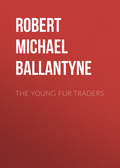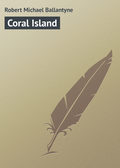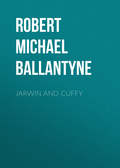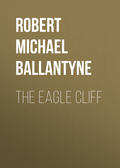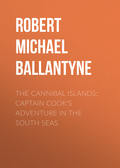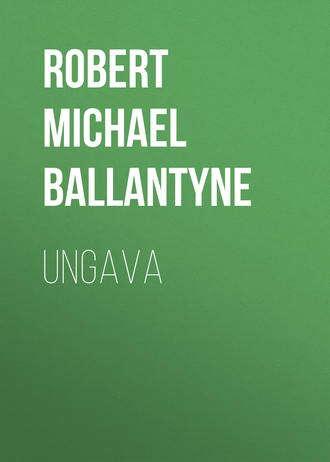
Robert Michael Ballantyne
Ungava
As Edith gazed, the Esquimau put out his hand with the stealthy motion of a cat and lifted his spear. The next instant the young ice that covered the hole was smashed, and, in an instant after, the ivory barb was deep in the shoulder of an enraged seal, which had thus fallen a sacrifice to his desire for fresh air. The Esquimau immediately lay back almost at full length, with his heels firmly imbedded in two notches cut in the ice at the edge of the hole; the seal dived, and the man’s waist seemed to be nearly cut in two. But the rope was tough and the man was stout, and although the seal was both, it was conquered in the course of a quarter of an hour, hauled out, and thrown exultingly upon the ice.
This man had only watched at the seal-hole a couple of hours, but the natives frequently sit behind their snow walls for the greater part of a day, almost without moving hand or foot.
Having witnessed this capture, Annatock drove on until the most of his countrymen were left behind. Suddenly he called to the dogs to halt, and spoke in a deep, earnest tone to his nephew, while both of them gazed intently towards a particular quarter of the sea. Edith looked in the same direction, and soon saw the object that attracted their attention, but the only thing it seemed like to her was an enormous cask or barrel.
“What is it?” said she to Peetoot, as Annatock selected his largest spear and hastened towards the object.
Of course Edith received no reply save a broad grin; but the little fellow followed up this remark, if we may so call it, by drawing his fingers through his lips, and licking them in a most significant manner. Meanwhile Annatock advanced rapidly towards the object of interest, keeping carefully behind hummocks of ice as he went, and soon drew near enough to make certain that it was a walrus, apparently sound asleep, with its blunt snout close to its hole, ready to plunge in should an enemy appear.
Annatock now advanced more cautiously, and when within a hundred yards of the huge monster, lay down at full length on his breast, and began to work his way towards it after the manner of a seal. He was so like a seal in his hairy garments that he might easily have been mistaken for one by a more intellectual animal than a walrus. But the walrus did not awake, and he approached to within ten yards. Then, rising suddenly to his feet, Annatock poised the heavy weapon, and threw it with full force against the animal’s side. It struck, and, as if it had fallen on an adamantine rock, it bounded off and fell upon the ice, with its hard point shattered and its handle broken in two.
For one instant Annatock’s face blazed with surprise; the next, it relapsed into fifty dimples, as he roared and tossed up his arms with delight at the discovery that the walrus had been frozen to death beside its hole!
This catastrophe is not of unfrequent occurrence to these elephants of the northern seas. They are in the habit of coming up occasionally through their holes in the ice to breathe, and sometimes they crawl out in order to sleep on the ice, secure, in the protection of their superabundant fat, from being frozen—at least easily. When they have had enough of sleep, or when the prickling sensation on their skin warns them that nothing is proof against the cold of the Polar Seas, and that they will infallibly freeze if they do not make a precipitate retreat to the comparatively warm waters below, they scramble to their holes, crush down the new ice with their tusks and thick heads, and plunge in. But sometimes the ice which forms on the holes when they are asleep is too strong to be thus broken, in which case the hapless monster lays him down and dies.
Such was the fate of the walrus which Annatock was now cutting up with his axe into portable blocks of beef. For several days previous to the thaw which had now set in, the weather had been intensely cold, and the walrus had perished in consequence of its ambitious desire to repose in the regions above.
Not far from the spot where this fortunate discovery had been made, there was a large sheet of recently-formed black ice, where the main ice had been broken away and the open water left. The sheet, although much melted by the thaw, was still about three inches thick, and quite capable of supporting a man. While Annatock was working with his back to this ice, he heard a tremendous crash take place behind him. Turning hastily round, he observed that the noise was caused by another enormous walrus, the glance of whose large round eyes and whose loud snort showed clearly enough that he was not frozen like his unfortunate companion. By this time the little boy had come up with Edith and the sledge. So Annatock ordered him to take the dogs behind a hummock to keep them out of sight, while he selected several strong harpoons and a lance from the sledge. Giving another lance to Peetoot, he signed to Edith to sit on the hummock while he attacked the grisly monster of the deep.
While these preparations were being made, the walrus dived; and while it was under water, the man and the boy ran quickly forward a short distance, and then lay down behind a lump of ice. Scarcely had they done so when the walrus came up again with a loud snort, splashing the water with its broad, heavy flippers—which seemed a sort of compromise between legs and fins—and dashing waves over the ice as it rolled about its large, unwieldy carcass. It was truly a savage-looking monster, as large as a small elephant, and having two tusks of a foot and a half long. The face bore a horrible resemblance to that of a man. Its crown was round and bulging, its face broad and massive, and a thick, bristling moustache—rough as the spines of a porcupine—covered its upper lip, and depended in a shaggy dripping mass over its mouth. After spluttering about a short time it dived again.
Now was Annatock’s time. Seizing a harpoon and a coil of line, he muttered a few words to the boy, sprang up, and running out upon the smooth ice, stood by the edge of the open water. He had not waited here more than a few seconds when the black waters were cleft by the blacker head of the monster, as it once more ascended to renew its elephantine gambols in the pool. As it rose, the Esquimau threw up his arm and poised the harpoon. For one instant the surprised animal raised itself breast-high out of the water, and directed a stare of intense astonishment at the man. That moment was fatal. Annatock buried the harpoon deep under its left flipper. With a fierce bellow the brute dashed itself against the ice, endeavouring in its fury to reach its assailant; but the ice gave way under its enormous weight, while Annatock ran back as far as the line attached to the harpoon would permit him.
The walrus, seeing that it could not reach its enemy in this way, seemed now to be actually endued with reason. It took a long gaze at Annatock, and then dived. But the Esquimau was prepared for this. He changed his position hastily, and played his line the meanwhile, fixing the point of his lance into the ice, in order to give him a more effective hold. Scarcely had he done so than the spot he had just left was smashed up, and the head of the walrus appeared, grinning and bellowing as if in disappointment. At this moment Peetoot handed his uncle a harpoon, and, ere the animal dived, the weapon was fixed in his side. Once more Annatock changed his position; and once again the spot on which he had been standing was burst upwards. It was a terrible sight to see that unearthly-looking monster smashing the ice around it, and lashing the blood-stained sea into foam, while it waged such mortal war with the self-possessed and wary man. How mighty and strong the one! how comparatively weak and seemingly helpless the other! It was the triumph of mind over matter—of reason over blind brute force. But Annatock fought a hard battle that day ere he came off conqueror. Harpoon after harpoon was driven into the walrus; again and again the lance pierced deep into its side and drank its life-blood; but three hours had passed away before the dead carcass was dragged from the deep by the united force of dogs and man. During this terrible combat Edith had looked on with such intense interest that she could scarcely believe her eyes when she found, from the position of the sun, that the day was far advanced. It was too late now to think of cutting up the carcasses without assistance, so Annatock determined to return home and tell his countrymen of his good fortune.
It is a custom among the Esquimaux to consider every animal that is killed as the common property of all—the successful hunter being entitled to all the titbits, besides his portion of the equal dividend; so that Annatock knew he had only to give the signal, and every able-bodied man in the village, and not a few of the women and children, would descend like vultures on the spoil. Jumping into his sledge, he stretched out his exhausted frame at full length beside Edith, and committed the whip to Peetoot.
“I’m so glad,” cried Edith, with a beaming face, “that we have killed this beast. The poor people will have plenty to eat now.”
“Ha! ha! ha!” roared Peetoot, giving increased emphasis to each successive shout, and prolonging the last into a yell of delight, as he cracked the ponderous whip from side to side like a volley of pistolry.
“O Peetoot!” exclaimed Edith, in a remonstrative tone, as the sledge swayed to and fro with the rate at which they were sweeping over the plain, “don’t drive so fast; you will kill the poor dogs!”
“Ho! ho! ho-o-o! Eeduck!” roared the boy, aiming a shot at the leader’s left ear, and bringing the thick end of the whip down on the flanks of the six hindmost dogs.
Thus, amid a volley of roars, remonstrances, yells, yelps, and pistolry, Edith and her friends scoured over the frozen sea, and swept into the Esquimau camp like a whirlwind.
Chapter Thirty One.
Another desperate battle, and a decided victory—The Esquimaux suffer a severe loss
The night that followed the day of which we have given an account in the last chapter was a night of rest to Edith, but not to the Esquimaux.
Scarcely allowing themselves time to harness their dogs, after the news reached them, they set off for the scene of action in a body. Every sledge was engaged, every able-bodied male and female started. None were left in camp except the sick, of whom there were few; and the aged, of whom there were fewer. While engaged in the hurried preparations for departure the women sang with delight, for they had been living on very short allowance for some weeks past, and starvation had been threatening them; so that the present success diffused among these poor creatures a universal feeling of joy. But their preparations were not numerous. A short scene of excited bustle followed Annatock’s arrival, a few yells from the dogs at starting, and the deserted camp was so silent and desolate that it seemed as if human beings had not been there for centuries.
It did not continue long, however, in this state. Two or three hours later, and the first of the return parties arrived, groaning under the burdens they carried and dragged behind them. The walrus-flesh was packed on the dog-sledges; but as for the few seals that had been caught, they were sledges to themselves—cords being tied to their tails, to which a dozen natives attached themselves, and dragged the carcasses over the snow.
Peetoot, whose spirit that night seemed to be intoxicated with success, and who felt that he was the lion of the night (after Annatock!), seated himself astride of one of the dead seals, and was dragged into camp on this novel sledge, shouting a volley of unintelligible jargon at the top of his voice, in the midst of which “Eeduck” frequently resounded. At length the last lingerer arrived, and then began a feast of the most extraordinary kind. The walrus-flesh was first conveyed to the igloo of Annatock, where it was cut up and distributed among the natives. The women seemed quite frantic with joy, and went about from hut to hut embracing one another, by way of congratulation. Soon the lamps of the village were swimming with oil, the steaks stewing and roasting, the children provided with pieces of raw blubber to keep them quiet while the larger portions were being cooked, and the entire community gormandising and rejoicing as savages are wont to do when suddenly visited with plenty in the midst of starvation.
During all this scene, Edith went about from hut to hut enjoying herself. Nay, reader, be not horrified; thou knowest not the pliable and accommodating nature of humanity. Edith did not enjoy the filth by which she was surrounded—far from it; neither did she enjoy the sight of raw blubber being sucked by little babies, especially by her own favourite; but she did enjoy the sight of so much plenty where, but a few hours ago, starvation had begun to threaten a visit; and she did enjoy and heartily sympathise with the undoubted and great happiness of her hospitable friends. A very savoury dish, with a due proportion of lean to the fat, cut specially to suit her taste, smoked on Eeduck’s table that night, and Peetoot and the baby helped her to eat it. Really it would be a matter of nice calculation to ascertain whether Peetoot or the baby laughed most on this jovial occasion. Undoubtedly the former had the best of it in regard to mere noise; nevertheless the pipe of the latter was uncommonly shrill, and at times remarkably racy and obstreperous. But as the hours flew by, the children throughout the camp generally fell asleep, while their seniors sat quietly and contentedly round their kettles and lamps, eating and slumbering by turns. The amount of food consumed was enormous, and quite beyond the belief of men accustomed to the appetites of temperate zones; but we beg them to remember that arctic frosts require to be met with arctic stimulants, and of these an immense quantity of unctuous food is the best.
Next morning the Esquimaux were up and away by daybreak, with their dogs and sledges, to bring home the remainder of the walrus-meat; for these poor people are not naturally improvident, and do not idle their time in luxurious indolence until necessity urges them forth again in search of food. In this respect they are superior to Indians, who are notoriously improvident and regardless of the morrow.
This day was signalised by another piece of success on the part of Annatock and his nephew, who went to the scene of yesterday’s battle on foot. Edith remained behind, having resolved to devote herself entirely to the baby, to make up for her neglect of the previous day. On reaching the place where the walrus had been slain, Annatock cut off and bound up a portion with which he intended to return to the camp. While he was thus employed, along with a dozen or more of his countrymen, Peetoot came running towards him, saying that he thought he saw a seal lying on the ice far ahead. Having a harpoon and two spears with them, Annatock left his work and followed his nephew to the spot where it was supposed to be lying. But on reaching the place they found that it was gone, and a few bells floating at the surface of the hole showed where it had made its descent to the element below. With the characteristic indifference of a man accustomed to the vicissitudes and the disappointments of a hunter’s life, the elder Esquimau uttered a grunt and turned away. But he had not proceeded more than a few paces when his eye became riveted on the track of some animal on the ice, which appeared to his practised eye to be quite fresh. Upon examination this proved to be the case, and Annatock spoke earnestly for a few minutes with his nephew. The boy appeared from his gestures to be making some determined remarks, and seemed not a little hurt at the doubting way in which his uncle shook his head. At length Peetoot seized a spear, and, turning away, followed the track of the animal with a rapid and determined air; while Annatock, grasping the other spear, followed in the boy’s track.
A brisk walk of half an hour over the ice and hummocks of the sea carried them out of sight of their companions, but did not bring them up with the animal of which they were in chase. At length Peetoot halted, and stooped to scrutinise the track more attentively. As he did so an enormous white bear stalked out from behind a neighbouring hummock of ice, and after gazing at him for a second or two, turned round and walked slowly away.
The elder Esquimau cast a doubtful glance at his nephew, while he lowered the point of his spear and seemed to hesitate; but the boy did not wait. Levelling his spear, he uttered a wild shout and ran towards the animal, which instantly turned towards the approaching enemy with a look of defiance. If Annatock had entertained any doubts of his nephew’s courage before, he had none now; so, casting aside all further thought on the subject, he ran forward along with him to attack the bear. This was a matter attended with much danger, however, and there was some reason in the man feeling a little uncertainty as to the courage of a youth who, he was aware, now faced a bear for the first time in his life!
At first the two hunters advanced side by side towards the fierce-looking monster, but as they drew near they separated, and approached one on the right, the other on the left of the bear. As it was determined that Annatock should give the death-wound, he went towards the left side and hung back a moment, while Peetoot advanced to the right. When about three yards distant the bear rose. The action had a powerful and visible effect upon the boy; for as polar bears are comparatively long-bodied and short-legged, their true proportions are not fully displayed until they rear on their hind legs. It seemed as if the animal actually grew taller and more enormous in the act of rising, and the boy’s cheek blanched while he shrank backwards for a moment. It was only for a moment, however. A quick word of encouragement from Annatock recalled him. He stepped boldly forward as the bear was glancing savagely from side to side, uncertain which enemy to attack first, and, thrusting his lance forward, pricked it sharply on the side. This decided the point. With a ferocious growl the animal turned to fall upon its insignificant enemy. In doing so its left shoulder was fully exposed to Annatock, who, with a dart like lightning, plunged his spear deep into its heart. A powerful shudder shook the monster’s frame as it fell dead upon the ice.
Annatock stood for a few minutes leaning on his spear, and regarding the bear with a grim look of satisfaction; while Peetoot laughed, and shouted, and danced around it like a maniac. How long he would have continued these wild demonstrations it is difficult to say—probably until he was exhausted—but his uncle brought them to a speedy termination by bringing the butt-end of his spear into smart contact with Peetoot’s flank. With a howl, in which consternation mingled with his glee, the boy darted away over the ice like a reindeer to convey the glad news to his friends, and to fetch a sledge for the bear’s carcass.
On returning to the village there was immediately instituted another royal feast, which continued from day to day, gradually decreasing in joyous intensity as the provender decreased in bulk, until the walruses, the bear, and the seals were entirely consumed.
Soon after this the weather became decidedly mild, and the power of the sun’s rays was so great that the snow on the island and the ice on the sea began to be resolved into water. During this period several important changes took place in the manners and customs of the Esquimaux. The women, who had worn deerskin shoes during the winter, put on their enormous waterproof summer boots. The men, when out on the ice in search of seals, used a pair of wooden spectacles, with two narrow slits to peep through, in order to protect their eyes from the snow-blindness caused by the glare of the sun on the ice and snow—a complaint which is apt to attack all arctic travellers in spring if not guarded against by some such appliance as the clumsy wooden spectacles of the Esquimaux. Active preparations were also made for the erection of skin summer tents, and the launching of kayaks and oomiaks. Moreover, little boys were forbidden to walk, as they had been wont to do, on the tops of the snow-houses, lest they should damage the rapidly-decaying roofs; but little boys in the far north inherit that tendency to disobedience which is natural to the children of Adam the world over, and on more than one occasion, having ventured to run over the igloos, were caught in the act by the thrusting of a leg now and then through the roofs thereof, to the indignation of the inmates below.
A catastrophe of this sort happened to poor Peetoot not long after the slaying of the polar bear, and brought the winter camp to an abrupt termination.
Edith had been amusing herself in her house of ice all the morning with her adopted baby, and was in the act of feeding it with a choice morsel of seal-fat, partially cooked, to avoid doing violence to her own prejudices, and very much under-done in order to suit the Esquimau baby’s taste—when Peetoot rushed violently into the hut, shouted Eeduck with a boisterous smile, seized the baby in his arms, and carried it off to its mother. Edith was accustomed to have it thus torn from her by the boy, who was usually sent as a messenger when Kaga happened to desire the loan of her offspring.
The igloo in which Kaga and her relations dwelt was the largest in the village. It was fully thirty feet in diameter. The passage leading to it was a hundred yards long, by five feet wide and six feet high, and from this passage branched several others of various lengths, leading to different storehouses and to other dwellings. The whiteness of the snow of which this princely mansion and its offices were composed was not much altered on the exterior; but in the interior a long winter of cooking and stewing and general filthiness had turned the walls and roofs quite black. Being somewhat lazy, Peetoot preferred the old plan of walking over this palace to going round by the entrance, which faced the south. Accordingly, he hoisted the fat and smiling infant on his shoulder, and bounded over the dome-shaped roof of Kaga’s igloo. Alas for the result of disobedience! No sooner had his foot touched the key-stone of the arch than down it went. Dinner was being cooked and consumed by twenty people below at the time. The key-stone buried a joint of walrus-beef, and instantly Peetoot and the baby lay sprawling on the top of it. But this was not all. The roof, unable to support its own weight, cracked and fell in with a dire crash. The men, women, and children struggled to disentomb themselves, and in doing so mixed up the oil of the lamps, the soup of their kettles, the black soot of the walls and roof, the dogs that had sneaked in, the junks of cooked, half-cooked, and raw blubber, and their own hairy-coated persons, into a conglomerate so atrocious to behold, or even think upon, that we are constrained to draw a curtain over the scene and spare the reader’s feelings. This event caused the Esquimaux to forsake the igloos, and pitch their skin tents on a spot a little to the southward of their wintering ground, which, being more exposed to the sun’s rays, was now free from snow.
They had not been encamped here more than three days when an event occurred which threw the camp into deep grief for a time. This was the loss of their great hunter, Annatock, the husband of Kaga. One of those tremendous north-west gales, which now and then visit the arctic seas and lands with such devastating fury, had set in while Annatock was out on the ice-floe in search of seals. Many of his comrades had started with him that day, but being a bold man, he had pushed beyond them all. When the gale came on the Esquimau hunters prepared to return home as fast as possible, fearing that the decaying ice might break up and drift away with them out to sea. Before starting they were alarmed to find that the seaward ice was actually in motion. It was on this ice that Annatock was employed; and his countrymen would fain have gone to warn him of his danger, but a gap of thirty feet already separated the floe from the main ice, and although they could perceive their friend in the far distance, busily employed on the ice, they could not make their voices heard. As the gale increased the floe drifted faster out to sea, and Annatock was observed running anxiously towards the land; but before he reached the edge of the ice-raft on which he stood, the increasing distance and the drifting clouds of snow hid him from view. Then his companions, fearful for their own safety, hastened back to the camp with the sad news.
At first Kaga seemed quite inconsolable, and Edith exerted herself as a comforter without success; but as time wore on the poor woman’s grief abated, and hope began to revive within her bosom. She recollected that the event which had befallen her husband had befallen some of her friends before in exactly similar circumstances, and that, although on many occasions the result had been fatal, there were not a few instances in which the lost ones had been driven on their ice-raft to distant parts of the shore, and after months, sometimes years, of hardship and suffering, had returned to their families and homes.
Still this hope was at best a poor one. For the few instances there were of return from such dangers, there were dozens in which the poor Esquimaux were never heard of more; and the heart of the woman sank within her as she thought of the terrible night on which her husband was lost, and the great, stormy, ice-laden sea, over whose surging bosom he was drifted. But the complex machinery of this world is set in motion and guided by One whose power and wisdom infinitely transcend those of the most exalted of His creatures; and it is a truth well worthy of being reiterated and re-impressed upon our memories, that in His hands those events that seem most adverse to man often turn out to be for his good.



